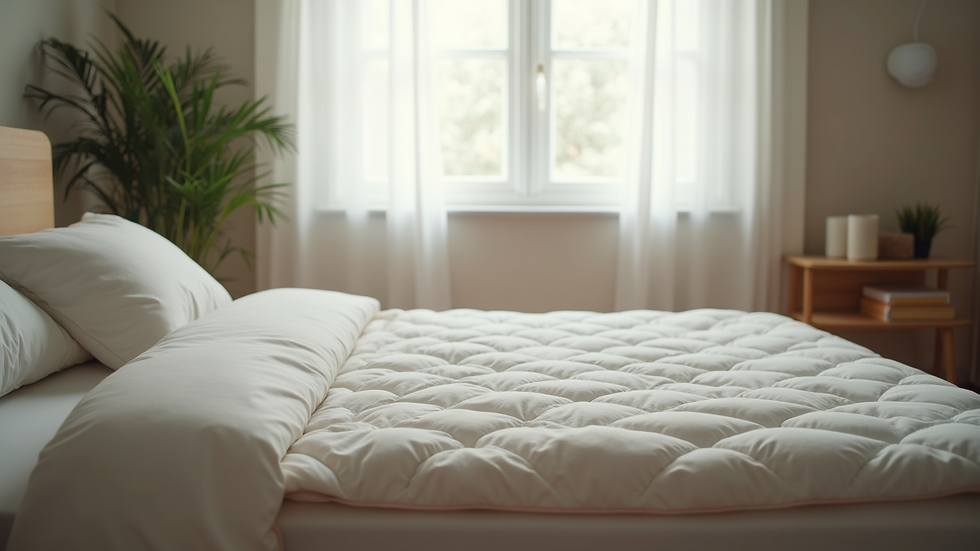Simple Habits to Improve Your Sleep Quality
- MATCO MATTRESS

- 6 minutes ago
- 4 min read
In today's fast-paced world, getting a good night's sleep can feel like a luxury. Many people struggle with insomnia or poor sleep quality, which can negatively impact overall health. Fortunately, there are simple habits you can adopt to enhance your sleep quality and wake up feeling refreshed. In this post, we will explore practical tips that can help you achieve better sleep.
Understanding the Importance of Better Sleep
Quality sleep is essential for physical health, mental well-being, and cognitive performance. According to the Centers for Disease Control and Prevention (CDC), about one in three adults do not get the recommended amount of sleep. Sleep supports various biological processes, including:
Physical Health: Good sleep helps in healing and repairing the heart and blood vessels.
Mental Well-being: It affects your mood and can reduce stress and anxiety levels.
Cognitive Function: Sleep enhances focus, memory, and decision-making skills.
As you can see, prioritizing sleep is crucial. Let's dive into some easy habits that can significantly improve your sleep quality.

Create a Sleep-Friendly Environment for Better Sleep
The space where you sleep plays a crucial role in determining your sleep quality. Here are some tips to create a conducive environment:
Keep Your Room Dark: Darkness cues your brain that it's time to sleep. Use blackout curtains or eye masks to eliminate light.
Control the Temperature: The ideal sleep temperature is typically between 60-67 degrees Fahrenheit (15-19 degrees Celsius). Adjust your thermostat accordingly.
Minimize Noise: If you're sensitive to sound, consider using a white noise machine or earplugs to drown out distractions.
Invest in a Good Mattress: A comfortable mattress is vital for restful sleep. Make sure your mattress suits your sleep style, whether you’re a back, side, or stomach sleeper.

Establish a Consistent Sleep Schedule
Maintaining a regular sleep schedule is one of the simplest habits to improve your sleep quality. Your body has a natural clock known as the circadian rhythm, which regulates your sleep-wake cycle. Follow these guidelines to establish consistency:
Go to Bed at the Same Time: Aim to go to bed and wake up at the same time every day, even on weekends. This practice reinforces your sleep cycle.
Gradually Adjust: If you need to change your sleep schedule, do it gradually. Shift your bedtime by 15-30 minutes each day until you reach your goal.
Limit Naps: If you nap during the day, make sure to keep it brief (20-30 minutes) and avoid napping late in the afternoon.
Incorporate Relaxation Techniques
Incorporating relaxation techniques into your nightly routine can signal your body to wind down. Here are some effective practices:
Mindfulness and Meditation: Spending just a few minutes in meditation can reduce stress and promote relaxation. Use apps or guided practices to help you get started.
Deep Breathing Exercises: Simple deep breathing exercises can calm your mind and body. Try inhaling deeply through your nose, holding it for a few seconds, and then exhaling slowly.
Stretching or Yoga: Gentle stretching or yoga before bed can relieve tension and promote relaxation. Consider a short routine focusing on your neck, shoulders, and back.

Mind Your Diet and Caffeine Intake
What you consume throughout the day can have a direct impact on your sleep. Pay attention to your diet and caffeine intake, especially close to bedtime.
Limit Caffeine: Caffeine can stay in your system for several hours. Try to avoid coffee, tea, chocolate, and energy drinks in the afternoon and evening.
Avoid Heavy Meals Before Bed: Eating a large meal can cause discomfort and affect your ability to fall asleep. Try to finish eating at least two to three hours before bedtime.
Stay Hydrated: While it’s essential to drink plenty of water during the day, try to limit your fluid intake in the evening to reduce nighttime trips to the bathroom.
Set Boundaries with Technology
In our digital age, technology often disrupts our sleep. Set boundaries to help you rest more effectively:
Create a Technology Curfew: Set a limit on screen time an hour before bed. The blue light emitted by screens can interfere with your melatonin production.
Establish a Charging Zone: Charge your devices away from your bedside to avoid the temptation of late-night scrolling.
Choose Calming Content: If you want to read or watch something before bed, opt for calming and relaxing content, avoiding intense news or action-packed shows.
Adopting these simple habits can lead to significant improvements in your sleep quality. Remember that persistence is key, and it may take time for these changes to yield results.
By implementing these strategies and making sleep a priority, you will not only feel better but also boost your productivity, mood, and overall quality of life. If you're seeking more tips for better sleep, consider exploring additional resources that can guide you on your journey to restful nights.
Consistency is Key
Lastly, commit to consistency. Improving your sleep quality is a gradual process. The more you adhere to these habits, the better your sleep will become. Keep track of what works for you and adjust as necessary. Everyone's sleeping needs vary, so personalizing your routine is important.
With these habits in place, you are well on your way to achieving the restful, restorative sleep you deserve. Sweet dreams await!
































Comments